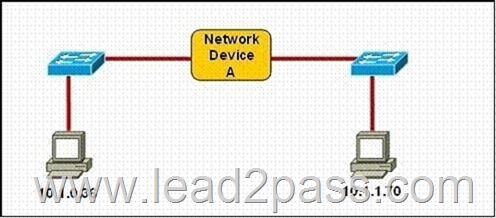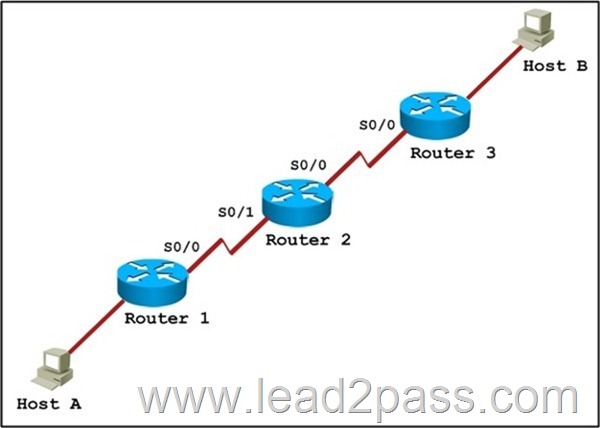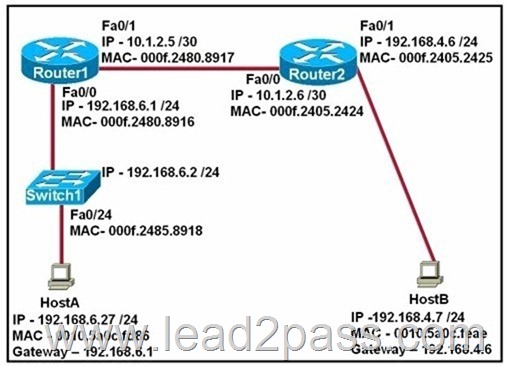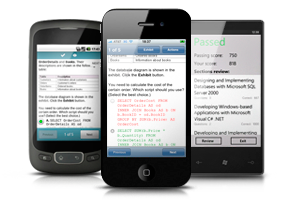2016 July Cisco Official New Released 200-125 Q&As in Lead2pass.com!
100% Free Download! 100% Pass Guaranteed!
Are you struggling for the 200-125 exam? Good news, Lead2pass Cisco technical experts have collected all the questions and answers which are updated to cover the knowledge points and enhance candidates’ abilities. We offer the latest 200-125 PDF and VCE dumps with new version VCE player for free download, and the new 200-125 practice test ensures your 200-125 exam 100% pass.
Following questions and answers are all new published by Cisco Official Exam Center: http://www.lead2pass.com/200-125.html
QUESTION 1
Refer to the exhibit. What will Router1 do when it receives the data frame shown? (Choose three.)
A. Router1 will strip off the source MAC address and replace it with the MAC address 0000.0c36.6965.
B. Router1 will strip off the source IP address and replace it with the IP address 192.168.40.1.
C. Router1 will strip off the destination MAC address and replace it with the MAC address 0000.0c07.4320.
D. Router1 will strip off the destination IP address and replace it with the IP address of 192.168.40.1.
E. Router1 will forward the data packet out interface FastEthernet0/1.
F. Router1 will forward the data packet out interface FastEthernet0/2.
Answer: ACF
Explanation:
Remember, the source and destination MAC changes as each router hop along with the TTL being decremented but the source and destination IP address remain the same from source to destination.
QUESTION 2
Refer to the exhibit. Which three statements correctly describe Network Device A? (Choose three.) 
A. With a network wide mask of 255.255.255.128, each interface does not require an IP address.
B. With a network wide mask of 255.255.255.128, each interface does require an IP address on a
unique IP subnet.
C. With a network wide mask of 255.255.255.0, must be a Layer 2 device for the PCs to communicate
with each other.
D. With a network wide mask of 255.255.255.0, must be a Layer 3 device for the PCs to communicate
with each other.
E. With a network wide mask of 255.255.254.0, each interface does not require an IP address.
Answer: BDE
Explanation:
If Subnet Mask is 255.255.255.128 the hosts vary from x.x.x.0 – x.x.x.127 & x.x.x.128- x.x.x.255,so the IP Addresses of 2 hosts fall in different subnets so each interface needs an IP an address so that they can communicate each other.
If Subnet Mask is 255.255.255.0 the 2 specified hosts fall in different subnets so they need a Layer 3 device to communicate.
If Subnet Mask is 255.255.254.0 the 2 specified hosts are in same subnet so are in network address and can be accommodated in same Layer 2 domain and can communicate with each other directly using the Layer 2 address.
QUESTION 3
Which layer in the OSI reference model is responsible for determining the availability of the receiving program and checking to see if enough resources exist for that communication?
A. transport
B. network
C. presentation
D. session
E. application
Answer: E
Explanation:
This question is to examine the OSI reference model. The Application layer is responsible for identifying and establishing the availability of the intended communication partner and determining whether sufficient resources for the intended communication exist.
QUESTION 4
Refer to the exhibit. Host A pings interface S0/0 on router 3. What is the TTL value for that ping? 
A. 252
B. 253
C. 254
D. 255
Answer: B
Explanation:
From the CCNA ICND2 Exam book: "Routers decrement the TTL by 1 every time they forward a packet; if a router decrements the TTL to 0, it throws away the packet. This prevents packets from rotating forever." I want to make it clear that before the router forwards a packet, the TTL is still remain the same. For example in the topology above, pings to S0/1 and S0/0 of Router 2 have the same TTL.
QUESTION 5
Which of the following describes the roles of devices in a WAN? (Choose three.)
A. A CSU/DSU terminates a digital local loop.
B. A modem terminates a digital local loop.
C. A CSU/DSU terminates an analog local loop.
D. A modem terminates an analog local loop.
E. A router is commonly considered a DTE device.
F. A router is commonly considered a DCE device.
Answer: ADE
Explanation:
The idea behind a WAN is to be able to connect two DTE networks together through a DCE network. The network’s DCE device (includes CSU/DSU) provides clocking to the DTE-connected interface (the router’s serial interface).
A modem modulates outgoing digital signals from a computer or other digital device to analog signals for a conventional copper twisted pair telephone line and demodulates the incoming analog signal and converts it to a digital signal for the digital device. A CSU/DSU is used between two digital lines –
For more explanation of answer D, in telephony the local loop (also referred to as a subscriber line) is the physical link or circuit that connects from the demarcation point of the customer premises to the edge of the carrier or telecommunications service provider’s network. Therefore a modem terminates an analog local loop is correct.
QUESTION 6
Refer to the exhibit. Refer to the exhibit. After HostA pings HostB, which entry will be in the ARP cache of HostA to support this transmission? 
Answer: A
Explanation:
When a host needs to reach a device on another subnet, the ARP cache entry will be that of the Ethernet address of the local router (default gateway) for the physical MAC address. The destination IP address will not change, and will be that of the remote host (HostB).
QUESTION 7
A network administrator is verifying the configuration of a newly installed host by establishing an FTP connection to a remote server. What is the highest layer of the protocol stack that the network administrator is using for this operation?
A. application
B. presentation
C. session
D. transport
E. internet
F. data link
Answer: A
Explanation:
FTP belongs to Application layer and it is also the highest layer of the OSI model.
QUESTION 8
A network interface port has collision detection and carrier sensing enabled on a shared twisted pair network. From this statement, what is known about the network interface port?
A. This is a 10 Mb/s switch port.
B. This is a 100 Mb/s switch port.
C. This is an Ethernet port operating at half duplex.
D. This is an Ethernet port operating at full duplex.
E. This is a port on a network interface card in a PC.
Answer: C
Explanation:
Modern Ethernet networks built with switches and full-duplex connections no longer utilize CSMA/CD. CSMA/CD is only used in obsolete shared media Ethernet (which uses repeater or hub).
QUESTION 9
A receiving host computes the checksum on a frame and determines that the frame is damaged. The frame is then discarded. At which OSI layer did this happen?
A. session
B. transport
C. network
D. data link
E. physical
Answer: D
Explanation:
The Data Link layer provides the physical transmission of the data and handles error notification, network topology, and flow control. The Data Link layer formats the message into pieces, each called a data frame, and adds a customized header containing the hardware destination and source address. Protocols Data Unit (PDU) on Datalink layer is called frame. According to this question the frame is damaged and discarded which will happen at the Data Link layer.
QUESTION 10
Which two types of NAT addresses are used in a Cisco NAT device? (Choose two.)
A. inside local
B. inside global
C. inside private
D. outside private
E. external global
F. external local
Answer: AB
QUESTION 11
What is the danger of the permit any entry in a NAT access list?
A. It can lead to overloaded resources on the router.
B. It can cause too many addresses to be assigned to the same interface.
C. It can disable the overload command.
D. It prevents the correct translation of IP addresses on the inside network.
Answer: A
QUESTION 12
Which protocol is the Cisco proprietary implementation of FHRP?
A. HSRP
B. VRRP
C. GLBP
D. CARP
Answer: A
QUESTION 13
Refer to the exhibit. What is the effect of the given configuration? 
A. It configures an inactive switch virtual interface.
B. It configures an active management interface.
C. It configures the native VLAN.
D. It configures the default VLAN.
Answer: A
We ensure our new version 200-125 PDF and VCE dumps are 100% valid for passing exam, because Lead2pass is the top IT certification study training materials vendor. Many candidates have passed exam with the help of Lead2pass’s VCE or PDF dumps. Lead2pass will update the study materials timely to make them be consistent with the current exam. Download the free demo on Lead2pass, you can pass the exam easily.
2016 Cisco 200-125 exam dumps (All 458 Q&As) from Lead2pass:
http://www.lead2pass.com/200-125.html [100% Exam Pass Guaranteed!!!]







